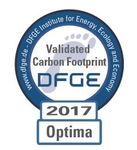Sustainability Report 2018 - Communication on Progress to the United Nations Global Compact - UN Global Compact
←
→
Page content transcription
If your browser does not render page correctly, please read the page content below
Preface
- Statement of continued support by the Chief Executive Officer -
We are happy to release our fourth Sustainability Report, which gives us a chance to present our
progresses made, but also reflect on the challenges still ahead of us.
2017 was a year of changes for Optima as we relocated our headquarter from Wang to
Hallbergmoos. Also, parts of our supply chain transformed as the market situation did. Therefore,
some new opportunities arrived for our supply chain engagement.
This report is also our annual Communication of Progress (COP) and will be published on the UN
Global Compact Website. Hereby, we reaffirm our commitment to core values in the areas of
human rights, labor, environment and anti-corruption we made with the signing of the UN Global
Compact in 2014.
Since 1984, Optima Pharmazeutische GmbH provides high-quality healthcare products.
Improving the ecological, economic and social impacts of our actions have been guidelines of
our entrepreneurial activity from the very beginning.
We invite all business partners and other interested parties to join and support us in realizing this
vision and get in contact with us in case of any questions or suggestions.
Hallbergmoos, Mai 2018
Michael Kroll Stefan Kroll
Managing Directors Optima Pharmazeutische GmbH
-2-Contents
Preface ............................................................................................................................................................................ 2
Contents ........................................................................................................................................................................ 3
1 Human Rights .................................................................................................................................................... 4
2 Labour .................................................................................................................................................................. 7
3 Environment ..................................................................................................................................................... 10
4 Anti-Corruption & Fair Business Practice ............................................................................................. 17
5 Community Engagement ............................................................................................................................ 19
6 Outlook .............................................................................................................................................................. 20
Further information:
Optima: Corporate Sustainability website
http://nachhaltigkeit.optimapharma.de/index.php/en/sustainability/sustainability.html
United Nations Global Compact
http://www.unglobalcompact.org/
-3-1 Human Rights
Principle 1: We support and respect the protection of internationally proclaimed human rights
Principle 2: We make sure that we are not complicit in human rights abuses
Human Rights in our own operations
Optima declares its full support for the United Nations Universal Declaration of Human Rights.
Optima’s operations are based in Germany and Switzerland. According to the Verisk Maplecroft
Human Rights Risk Index 2016, Optima’s operation countries have a low prevalence of human
rights-related risks (see “Further information”). Our research and development activities are
carried out exclusively in Germany, in cooperation with renowned research institutions. All quality
standards and sector commitments are fully adhered to. One of our main research partners is
also a signee to the UN Global Compact.
Human rights in our supply chain
Optima’s supply chain which is formed by numerous tier 1 suppliers is located in Germany and
France. As mentioned above, those countries are considered holding a low potential of human
rights infractions. Therefore, the exposure to human rights-related risks in case of tier 1 suppliers
is also considered minimal.
Our detailed sustainability standards for our suppliers require them to adhere to the UN Global
Compact Principles (see “Further information”).
Also, tier 1 suppliers are requested to report any human rights-related incidents in their own
operations or supply chains to Optima. As a measurement of outcome, we monitor the number
of complaints, incidents or other issues related to human right abuses, both in our own operations
and our supply chain. In the last year, as in the year before, no such incidents were brought to
the knowledge of Optima.
✓ 0 human rights-related incidents
-4-In late 2016/early 2017, Optima itself completed a document assessment by ethical trade initiative
SEDEX.
The inquiries were not only answered, but parts were also included into our own supplier audits.
Therefore, our supplier audit process was expanded by the dimension of sustainability in
accordance with the content promoted by the Ethical Trade Initiative (ETI Base Code, see “further
information”). These topics were actively addressed during the on-site audits in 2016 and 2017.
For Human Rights topics, this includes the following criteria:
- Management systems / Code of Conduct for sustainability management
- Harsh or inhumane Treatment
- Entitlement to work
In addition, audited suppliers are requested to declare conformity to the ETI Base Code, as well
as to Optima’s Standards for Sustainable Procurement, and all applicable national and
international laws and regulations.
In the reporting year, three of our main suppliers have been audited by us. Based on our own risk
assessment, we have thus covered all suppliers with even a remote exposure to said risks.
✓ Three successful on-site supplier audits addressing human rights issues
Human rights in the downstream value chain
Notoriously, the downstream value chain (e.g. in logistics and distribution) only gains little
insights into human rights conditions. 92,5% of Optima’s sales volume is directed to EU countries
(including Switzerland) and 7,5% to Australia, New Zealand and Canada. Therefore, a general
compliance of the downstream value chain partners with the existing legal requirements
concerning human rights can be assumed.
-5-Regarding our downstream value chain partners, we encourage partners to participate in
voluntary sustainability and human rights codices, like the UN Global Compact or the German
Sustainability Codex. In 2017, about two thirds of our key customers were signatories to the UN
Global compact or similar voluntary codices (e.g. German Sustainability Codex), and/or have an
own policy for the protection of human rights. Although this share was not increased compared
to 2016, it is planned to keep engaging with value chain partners on this topic.
✓ 2/3 of key customers are publicly committed to fighting human rights abuses
Further information
Ethical Trading Initiative: http://www.ethicaltrade.org
Optima: Standards for Sustainable Procurement (German)
http://nachhaltigkeit.optimapharma.de/images/microsites/nachhaltigkeit/pdf/standards_for_sustainable_pr
ocurement.pdf
SEDEX: https://www.sedexglobal.com
Verisk Maplecroft: Human Rights Risk Index 2016
https://reliefweb.int/sites/reliefweb.int/files/resources/2016_ITF_Human_Rights_Index_2016-
01.pdf
-6-2 Labour
Principle 3: We uphold the freedom of association and the effective recognition of the right to
collective bargaining;
Principle 4: the elimination of all forms of forced and compulsory labour;
Principle 5: the effective abolition of child labour; and
Principle 6: the elimination of discrimination in respect of employment and occupation
Working conditions
One of our key concerns is the creation of optimal working conditions for all employees. Our goal
is not only to match the legal requirements, but to exceed those wherever possible. Optima
enables and encourages part-time employment of employees of both genders by offering flexible
contracts.
Equal opportunities and employee rights
Optima guarantees its employees the freedom of association and the
right to collective bargaining as regulated by national and European
laws and standards.
Optima is an equal opportunities employer. We strive actively against
discrimination of employees. We fully comply with national and
European employee protection and anti-discrimination legislation.
We provide ongoing training and qualification initiatives to our
employees and focus on a long-term, cooperative HR development
strategy. Our employees are our capital.
Midst 2017, the headquarter of Optima was moved 30 km to Hallbergmoos. Because of the longer
commuting distances and connected higher costs for our employees, we decided to support
them with financial assistance and by offering attractive lunch options at the new site.
Also, we try to improve the work-life-balance of our staff. Wherever possible, we try to provide
flexible solutions for new aspirants and long-term employees.
-7-We monitor the number of incidents regarding employee rights or discrimination (e.g. formal
complaints, legal conflicts etc.), of which there were none in the last year. For 2018, we also aim
to keep this number at zero.
✓ 0 labour rights-related incidents
No child or forced labour
Our employment policy is in accordance to legal requirements and we have no employees under
the age of 18. The same applies to any kind of forced or compulsory labour.
Labour standards in our supply chain
The vast majority of our tier 1 suppliers are located in Germany and France. Those countries have:
• a low level of child labour risk according to the Child Labour Index 2014
• a low level of working conditions risk according to the Working Conditions Index 2014 (see
“Further information”)
Our supplier standards for sustainable procurement explicitly include the compliance with all
legal requirements and the labour-related Principles of the UN Global Compact.
Our key supplier audits conducted in 2017 (see chapter 2) also covered labour topics based on
the standards put forward by the Ethical Trade Initiative (ETI Base Code, see “further information”
in Chapter 1), such as:
- Freedom of employment
- Freedom of association
- Safety and hygienic conditions
- Child labour
- Working conditions, flexibility, remunerations and benefits
Accordingly, we have thus covered all suppliers with a potential exposure to said risks.
✓ Three successful on-site supplier audits addressing labour issues
-8-Further information
Optima: Standards for Sustainable Procurement
http://nachhaltigkeit.optimapharma.de/images/microsites/nachhaltigkeit/pdf/standards_for_sustainable_pr
ocurement.pdf
Maplecroft: Child Labour Index 2014
http://maplecroft.com/portfolio/new-analysis/2013/10/15/child-labour-risks-increase-china-and-russia-
most-progress-shown-south-america-maplecroft-index/
Maplecroft: Working Conditions Index 2014
https://maplecroft.com/portfolio/new-analysis/2014/01/29/world-cup-host-qatar-among-11-countries-
downgraded-lsquoextreme-riskrsquo-working-conditions-maplecroft-index/
-9-3 Environment
Principle 7: We support a precautionary approach to environmental challenges;
Principle 8: undertake initiatives to promote greater environmental responsibility; and Principle 9:
encourage the development and diffusion of environmentally friendly technologies
Environmental sustainability is a key concern of the management and the employees alike.
Although Optima’s products do not require large amounts of energy or natural resources in
production or use, we accomplish the responsibility for minimizing negative impacts. While
Optima is not directly exposed to significant environmental risks, energy and resource availability
play an important role. Due to our relocation, we had to assess the given situation in the new
building and reestablish a sustainable surrounding in the new rooms in 2017.
Energy use
Energy production and use is a main source of greenhouse gas emissions. The use of renewable
energies is a way to reduce energy-related emissions. As we relocated, the use of pellet /
woodchip heating was no longer available. Now, we are relying on district heat. Also, in December
2017 we changed our energy supply to Greenpeace Energy.
Efficient energy and resource use is a topic that needs to be integrated broadly into business
process. Optima has therefore extended its internal Quality Management Guidelines to cover
these topics in relevant processes, for example in the training of new and existing staff members.
Contract manufacturers are also instructed to optimize energy efficiency. Optima requests yearly
energy consumption figures from all contract manufacturers, related to the work carried out for
Optima.
Within our on-site supplier audits conducted in 2017, we have also covered the subject of
environmental impacts, including:
- Continuous improvement of environmental performance
- Compliance with all applicable laws and regulations
- 10 -✓ 100% coverage of energy consumption by contract manufacturers
✓ Three successful on-site supplier audits addressing ecological issues
Transportation & Mobility
Regarding energy use for transportation and packaging, Optima is working continuously on
optimizing production structure and processes. One example is the restructuring of production
for one of our main products. Since 2015, production and final packaging are done at the same
location.
In 2017, we continue to work on improving the centralization of
our distribution by sending out individual shipments directly
from the location of manufacturing. This eliminates the need of
having the packaged products sent back to our headquarters for
distribution.
Regarding sustainable employee mobility, Optima continued to
use a battery-electric vehicle. The charging station provides
power from renewable sources, and therefore allows emission-
free business travels. The car has been used widely for near- to
Optima’s electric company car, a Volkswagen medium-range travels, and feedback by employees is decidedly
e-Golf
positive. In the reporting period, 12 000 km were travelled and
Greenhouse gas emissions in the magnitude of 2 250 kg were
avoided compared to an efficient diesel vehicle.
We also decided to pro-actively step back from the use of diesel powered cars. One of our cars
was converted from diesel to gasoline. Also, end of 2017 we signed a leasing contract for a new
company car which is natural gas powered and kept climate neutral. This will be delivered midst
of 2018. For future, the exchange of two more diesel cars is planned.
✓ Continued use electric vehicle & charging infrastructure
✓ 12 000 km travelled emission-free, 2 250 kg CO2e avoided
✓ Step-by-step reduction of diesel-related emissions
- 11 -Resource-friendly expansion strategy
Due to constantly growing company activity, we had reached the limits of our old headquarter
building. We have therefore assessed several options to extend our old facility, erecting a new
building or relocating to another location. In 2016, we decided to move to an existing building
approximately 30 km from our previous location. Besides practical advantages, this solution also
has ecological benefits, since materials and energy consumption and therefore greenhouse gas
emissions for constructing a new building are avoided, which would have had a significant impact
on our carbon footprint.
Downside to this solution is, however, that for some employees commuting distances may be
longer to the new location. To compensate for ecological effects, Optima compensates all non-
avoidable emissions also from employee commuting.
Greenhouse gas emissions balance
Starting with the year 2012, we are assessing our annual
Corporate Carbon Footprint, meaning the greenhouse gas
emissions balance of all company operations, including up- and
downstream processes of the value chain. The advantage of the
Carbon Footprint is that it includes emissions from energy and
fuels, material-related emissions of the upstream and
downstream value chains as well as other indirect emission
sources like business travel and commuting of employees. Thus,
it gives valuable insights into the ecologic hotspots of a
company’s environmental balance and provides a single indicator
that is easy to monitor.
The calculation itself is carried out by our environmental consulting partner DFGE –
Institute for Energy, Ecology, Economy, in accordance with the GHG Protocol standard.
- 12 -The total emissions for Optima amount to 500 t CO2e for
calendar year 2016.
Of these, 3% are caused by consumption of fuels for
vehicles and heating (Scope 1). Emissions from
purchased energy (Scope 2) also amount to 3%. The
majority of emissions, with 94%, are other indirect
emissions that occur along the value chains.
Compared to the previous year, absolute emissions have
decreased notably from 611 t CO2e to 500 t CO2e by
18%, mainly due to lower sales and connected lower production figures.
Within Scope 3, especially the category of Purchased Goods & Services influences our emissions
balance. This category includes the energy related emissions of contract manufacturing as well
as value chain emissions of the materials used in production. The following graphic shows the
share of emissions within Scope 3.
Besides the absolute emission amounts, we
calculate our “emission intensity”, i.e. the relative
emissions per piece of production output. This
provides a clearer view of improvements in
efficiency, even if the absolute carbon footprint is
increasing due to growth in business activity. From
2015 to 2016, relative emissions increased slightly
from 88 g CO2e to a value of 93 g CO2e per piece
of output produced (including Scope 1, 2 and 3
emissions).
The reason for this mostly lies within the decrease
of business activities in Australia. For 2017/18,
emissions per output may be more stable.
✓ Absolute emissions reduced by 18%
✓ Three successful on-site supplier audits addressing ecological issues
- 13 -Optima - a climate-neutral company
Energy and resource consumption and related emissions can be
reduced by efficiency measures – but only to a certain point.
However, Optima also takes responsibility for all non-avoidable
emissions. Therefore, we compensate all our Scope 1, 2 and 3
emissions as calculated in the Carbon Footprint, by financing
certified emission reduction projects.
Since 2014, Optima has supported a reforestation and
community support project in Zimbabwe through the purchase
of Verified Carbon Standard emission reduction certificates. This
project not only contributes to reducing Greenhouse gas
Supported Reforestation/Community support project
“Kariba REDD+” in Zimbabwe
emissions, but also provides sustainable livelihood options for
local communities, by funding healthcare centers, community
©South Pole Group - southpolegroup.com gardens, school fee subsidies etc.
The Carbon Footprint as well as the compensation have been
certified by TÜV Hessen, and Optima has been awarded as
“climate neutral company” according to the TÜV ProfiCert
Standard Climate Neutrality.
Optima has committed itself to continue the compensation of
100% of non-avoidable emissions over the coming years. In
2018, this ongoing compensation has been re-audited
successfully by TÜV Hessen.
✓ 100% of Scope 1+2+3 emissions compensated
- 14 -Natural resources / raw materials
An important focus area regarding environmental impacts is the provenience of natural raw
materials used. Depending on the method and region of production, these may have larger or
smaller environmental impacts. In the case of Optima’s products, paper is the most relevant
material by quantity, as it is used in the individual product package, as well as for shipping boxes,
leaflets etc.
Optima’s goal is to use as much recycled paper as possible. For the remaining
amount of non-recycled paper, we are using FSC (or alternatively PEFC)
certified paper, wherever available. In 2017, we have managed to use 100%
certified (or recycled) paper for all product packaging and in our office
operations
Equally, Optima’s tier 1 suppliers and contract manufacturers are requested to
use recycled paper wherever possible, and FSC (or PEFC) certified paper in all
other cases. If no certified products are available, materials from known and
legal sources must be used, which do not cause avoidable negative ecological
and social impacts like deforestation, land use conflicts etc.
✓ 100% certified paper for product packaging and office use
Regarding product ingredients, two important naturally sourced materials are ethanol and soy
lecithin, which may be related to increased ecological impacts. However, the absolute amount of
material used is limited. Optima’s tier 1 suppliers are requested to comply with all applicable
environmental, health, labour and social standards when sourcing natural materials, and ensure
that they do not cause avoidable negative ecological and social impacts like deforestation, land
use conflicts etc.
- 15 -Waste and recycling
Regarding our products, the central focus lies on supreme quality and safety, but we also care
about their end-of-life phase: Our products are not harmful to the environment and can be safely
disposed of by regular means. Paper boxes, leaflets, empty glass containers and plastic caps can
and should be recycled. We are currently working on supplementing
Through their innovative formulation and application method, our liposomal eye sprays have a
much longer usage time compared to alternative products. This means that the amount of waste
is reduced drastically compared to other products, especially those with one-dose packaging.
Further information:
DFGE/Optima: Carbon Footprint Balance Year 2017 - Management Summary
http://nachhaltigkeit.optimapharma.de/index.php/en/sustainability/climate-protection.html
TÜV Hessen: Certificate– Climate Neutrality
http://nachhaltigkeit.optimapharma.de/images/microsites/nachhaltigkeit/pdf/optima_tuevhessen_klimane
utralitaet.pdf
South pole Group: Kariba REDD+ Reforestation Project Description & Video
http://www.thesouthpolegroup.com/projects/community-development-protects-forests#
- 16 -4 Anti-Corruption & Fair Business Practice
Principle 10: We work against corruption in all its forms, including extortion and bribery.
Clear stance against corruption
Optima condemns all forms of corruption. We believe in fair and open competition and are
convinced that quality, innovation and efficiency are the key to long term business success.
The commitment to prevent all forms of corruption has been integrated in our internal Quality
Management Handbook.
Anti-corruption action in our value chain
Optima has issued clear standards for its suppliers that include the
compliance with all legal requirements and requests them to adhere
to the UN Global Compact Principles on fighting corruption.
The 2014 Corruption Risk Index by Maplecroft shows that the
countries in which Optima operates and where the majority of
suppliers are located have a “low” risk of corruption, with the
exception of Austria with “medium” risk (see “Further Information”).
Optima monitors the number of incidents related to corruption of
any form, both within the company and the supply chain. In the last
year, there were none such incidents brought to the knowledge of Optima. We aim to keep up
this performance in the coming year.
✓ 0 corruption-related incidents
Furthermore, we monitor the share of key customers that have published an own code of conduct
or policy regarding corruption and/or are signatures to the UN Global Compact or similar codices.
In the last year, about two thirds of our key customers have made such a public commitment.
- 17 -Within our on-site supplier audits conducted in 2017, we have also covered the subject of
business ethics based on the standards put forward by the Ethical Trade Initiative (ETI Base Code,
see “further information” in chapter 1), including:
- Bribery and fraud prevention
- Existence of a business ethics policy / code of conduct
- Compliance with all applicable laws and regulations
✓ 2/3 of key customers are publicly committed to fight corruption
✓ Three successful on-site supplier audits addressing business ethics issues
Further information:
Maplecroft: Corruption Risk Index 2014
http://maplecroft.com/portfolio/new-analysis/2013/09/24/corruption-risk-index-reveals-long-term-lack-
will-tackle-corruption-brics/
- 18 -5 Community Engagement
Optima compensates all its Greenhouse Gas emissions by funding certified projects around the
world. However, as a locally rooted company, Optima would like to contribute to an intact and
valuable environment in our Bavarian home region. Therefore, in 2015 Optima decided to support
the regional initiative “Bergwald-Projekt e.V.”, which is working to re-naturalize and stabilize
endangered forest areas in the Bavarian mountain regions, which were affected by climate
change-related developments like storms, temperature changes and vermin damages.
As in 2016, Optima has enabled the plantation of another 5000 trees also
in 2017, supporting the reforestation and stabilization of more than a
hectare of forest. Several endemic tree species were combined here to
form a natural forest composition, with resilience to temperature
extremes, droughts and vermin.
Since 2014, Optima is also supporting the Plant for the Planet Foundation
on a yearly basis. This non-profit organization based in Bavaria tackles
climate change by promoting reforestation and the planting of trees all
Plantation of oak trees by Bergwaldprojekt e.V. over the world. The project was supported with 25.000 additional trees
again which were planted in Campeche / Mexico by the donation of
© Bergwaldprojekt e.V., www.bergwaldprojekt.de
Optima. The goal of this projects is not only to reforest the region again,
but also raising awareness concerning sustainable forest management and to strengthen the
wood related job market (forest work, wood processing, etc.) within the region.
In addition, the shareholder of Optima decided to support the Oxfam project in Burkina Faso for
establishing a sustainable livelihood in December 2017. The donation covers the estimated own
funds which Oxfam will spend in the project in 2018 and 2019.
Further information:
Bergwaldprojekt & Plant for the Planet: Information, Project Report and Certificates:
http://nachhaltigkeit.optimapharma.de/index.php/nachhaltigkeit/klimaschutz/weitergehendes-engagement-fuer-den-
klimaschutz
Plant for the Planet: Supporter List: http://www.plant-for-the-planet.org/de/unterstuetzen/partnerschaft
Oxfam’s project in Burkina Faso : https://www.oxfam.de/unsere-arbeit/projekte/burkina-faso-integrierter-ansatz-gegen-
hunger
- 19 -6 Outlook
As most effort of 2017 was dedicated to the relocation of Optima’s headquarter, 2018 offers
several opportunities for further improvement. We will continue to strive the reduction of our
ecological impact on a day-to-day basis. As the assembly of our products still takes place in
multiple locations, the main goal for 2018 is to finally centralize the whole packaging step. This
will help to reduce transportation emissions and makes it easier to track the impact of that step.
Also, we hope to provide even more attractive working conditions for our employees and to keep
exceeding the expectations of our customers and the users of our products.
The implementation of sustainability topics in our supplier audits marks one big milestone of our
supply chain engagement so far. As our supplier structure underwent several changes in 2017,
the main goal for 2018 is to establish a better network with our new and old partners and raise
more awareness about the necessity of our work in that topic. Traditionally, new suppliers need
to be introduced into working with our high requirements. Once we fully initiated the dialogue,
we hope to convince our new business partners of the importance of a solid CSR-strategy and
supply chain engagement.
We invite all partners, customers, suppliers and other stakeholders to communicate openly with
Optima regarding all sustainability topics.
All new information and reports will be published in the sustainability section of our homepage:
http://nachhaltigkeit.optimapharma.de/index.php/en/sustainability/sustainability.html
- 20 -© 2018 Optima Pharmazeutische GmbH
Ludwigstraße 49, 85399 Hallbergmoos, Germany
Tel.: +49 (0) 811 / 555 393 - 0
E-Mail: info@optimapharma.de
Internet: www.optimapharma.de
Produced with assistance by
DFGE – Institute for Energy, Ecology, Economy
Kreitstr.5, 86926 Greifenberg, Germany
Tel.: +49 (0) 8192 / 99733-20
E-Mail: info@dfge.de
Internet: www.dfge.de
- 21 -You can also read


























































